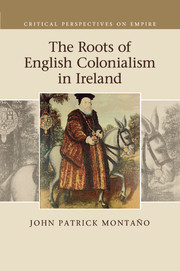1 - Planting a landscape
cultivation and reform in Ireland
Published online by Cambridge University Press: 05 February 2012
Summary
The earl of his own free will
Surrendered the city to the king:
To the king he surrendered Waterford
Of his own will and agreement.
Homage for Leinster
He did to the king of England:
The earl of great worth
Did homage for Leinster
He did to the king of England:
The earl of great worth
Did homage to his lord.
The rich king granted to him
Leinster in fee.
This passage from The Song of Dermot and the Earl is an early example of the dense cloud of unknowing that came to characterize relations between England and Ireland. Henry II spent only six months in Ireland laying claim to the lordship granted him by Pope Adrian. But when the “rich king” received the City of Waterford and others from Strongbow – “the earl of great worth” – and granted him Leinster in return, he demonstrated a crucial failure to understand the distinction between English and Irish landholding, and sowed the dragons’ teeth of centuries of conflict. On the one hand, Strongbow’s homage to Henry meant that he now held his lands from the king, extending feudal tenure and the king’s authority to the kingdom of Leinster. On the other hand, such homage entirely transformed the original agreement in which Dermot, the exiled king, had agreed to marry his only child and heir, Aoife, to Strongbow in exchange for armed support in recovering his lands. Most important of all, whatever the extent of the ignorance of Henry and his vassals, according to Irish inheritance customs, Dermot had no (Irish) legal right to grant or promise lands to Strongbow or anyone else. For the invaders, a wife brought land and titles, but for the Irish the land belonged to the group, and the kingship was elective: it is this fundamental difference about landholding, inheritance, and tenure that will bedevil relations between the two cultures from the outset. Indeed, English assumptions about the social, economic, and cultural implications of the absence of feudal tenures, primogeniture, and individual property rights in Ireland can provide an ideal perspective from which to view English efforts to civilize, to settle, and to govern Ireland.
- Type
- Chapter
- Information
- The Roots of English Colonialism in Ireland , pp. 22 - 63Publisher: Cambridge University PressPrint publication year: 2011



